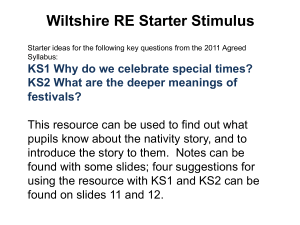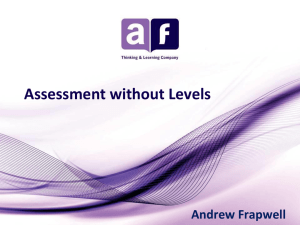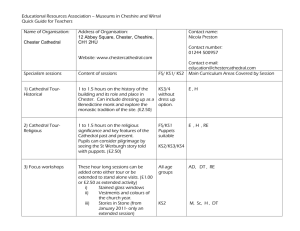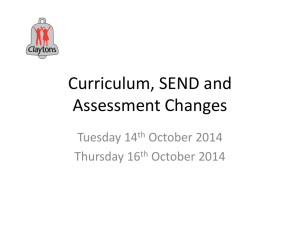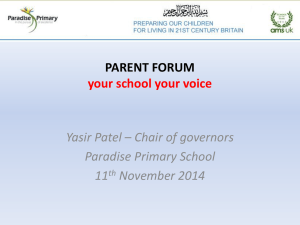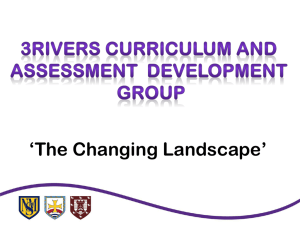When you are born matters
advertisement
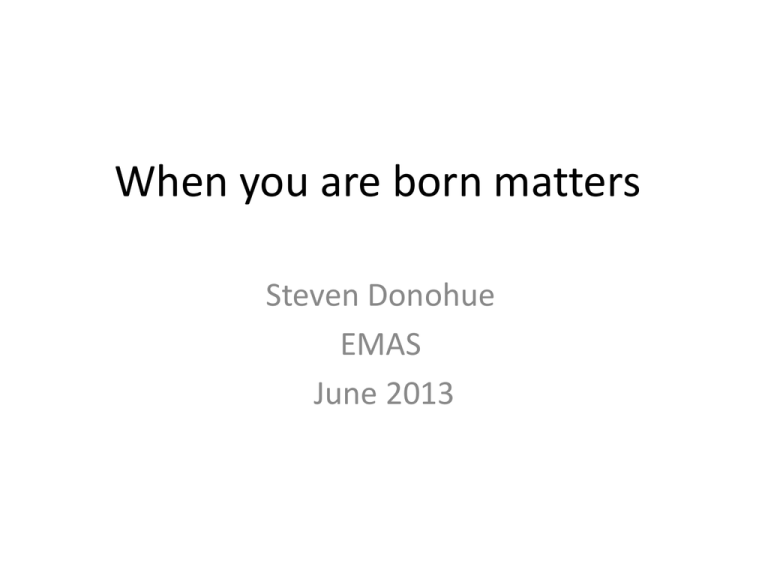
When you are born matters Steven Donohue EMAS June 2013 When you are born matters: The impact of Date of Birth on Child Cognitive Outcomes in England – Crawford, Dearden, Meghir, IFS, 2007 Month of Birth and Education – Schools Analysis and Research Division, DfE, 2010 When you are born matters: evidence for England – Crawford, Dearden, Greaves, IFS, 2013 “10,000 summer-born children per year fail to achieve [5A*-C including English and Maths] as GCSE, which influences their chances of progressing to A-levels and beyond, purely... due to the timing of their birth...” 2012 GCSE gaps (5A*-C inc E and M, percentage points, England) Not SEN - SEN 46.8 Not FSM - FSM 26.3 Girls - Boys 9.5 September born – August born 7.8 Asian ethnicity – all pupils 3.9 First language English – Not Eng. 3.0 Four research questions 1.What’s the extent of the “birth penalty” across phases? 2.What’s the impact of admissions policies in YR? 3.Why does the “birth penalty” exist? 4.How does it affect subgroups (e.g. August birth date + FSM)? Data Attainment data from: EYFS KS1 Standardised APS KS2 % pupils reaching expected level KS3 % pupils exceeding expected level KS4 KS5 + pupil characteristics from school census Cohorts No single cohort for which there is data at all levels, so: Cohort Data 1 10% of children born in 97/98 and 98/99 EYFS, KS1 2 All children born in 90/91 and 91/92 KS1, KS2, KS3 3 All children born in 85/86, 86/87 and 87/88 KS2, KS3, KS4, KS5 Group 2 Mean standardised APS at KS1, KS2, KS3 Group 3 Mean standardised APS at KS2, KS3, KS4 Wiltshire – KS2 L4+ Cohort September August born (%) born (%) Gap (Wilts) Gap (England) 2010 79.0 64.2 14.8 8.8 2011 80.0 71.6 8.4 11.1 2012 83.2 72.1 11.1 9.1 Wiltshire – KS4 5 A*-C inc. English and Maths GCSE Cohort September July born born (%) (%) Gap (Wilts) Gap (England) 2010 63.1 50.3 12.8 7.8 2011 65.3 54.1 11.2 7.7 2012 60.7 57.5 3.2 7.8 Key findings What’s the extent of the “birth penalty” across phases? “...there is evidence of a significant August birth penalty in all outcomes at every age... it declines over time, but is still significant at ages 16 and 18, when students are making decisions about employment and/or future study.” “significant” = significant at the 1% level Key findings What’s the extent of the “birth penalty” across phases? At the age of 11, August-born girls are 25% more likely to have statemented SEN and 72% more likely to have nonstatemented SEN compared to September-born girls. The figures for boys are 14% and 46% respectively. Key findings Socio-emotional development Dark green – Millennium Cohort Study; Light green – Avon Longitudinal Study Key findings Self-perception Light green – Avon Longitudinal Study; Grey – Longitudinal Study of YP in England Key findings Adult outcomes • those born at the end of the academic year are significantly more likely to be unemployed than those born earlier • no significant difference for earnings/hr • no significant differences for occupation, household income, intergenerational mobility, health status or mental well-being. Key findings What’s the impact of admissions policies in YR? “August-born children are slightly better off (and certainly no worse off) if they start school in the September of the academic year they turn 5... this is likely to be of greater benefit to girls than to boys.” Key findings Why does the “birth penalty” exist? Key findings Why does the “birth penalty” exist? Key findings How does it affect subgroups? FSM Children from deprived areas Children of different ethnic origins “...the most important finding is the lack of significant differences amongst the majority of subgroups considered.” Options “...somebody always has to be youngest...” IFS’s Options 1. Age normalisation of test results 2. Testing when ready 3. Changes to free nursery provision and flexibility over school starting ages 4. Other options a. YR admissions policies b. Teacher training c. Investigating successful schools Assessment As part of our reforms to the national curriculum , the current system of ‘levels’ used to report children’s attainment and progress will be removed. It will not be replaced... Schools will be able to introduce their own approaches to formative assessment, to support pupil attainment and progression. What opportunities might this open up for summerborn children? Assessment “Assessing when ready” – schools could report on what age pupils reached a level of achievement (like the EYFS profile...) Now Assessed at a single point in time (say June Y5) Levels reported without reference to age – Sandra L4a, Jamal L4c In future? Continuous assessment Age at which level was reached is reported – Sandra reached L4c aged 10.2, Jamal reached L4c aged 9.9 Auditing What’s happening in your school? • Look at attainment... • Look at average age of groups (e.g. top set Maths, bottom set Maths...) It’s easy to work out how many days old someone is using Excel! Teacher awareness There’s some evidence teachers underrate summer-born children. Summer-born children are more likely to have KS2 teacher assessments that are lower than their English SATs results “...teacher assessments might penalise the performance of relatively younger pupils in the cohort...” School to school Are any schools able to identify that their summer-born pupils are doing well? Are any schools able to identify specific pieces of good practice that have made a difference? http://tinyurl.com/summerborn


